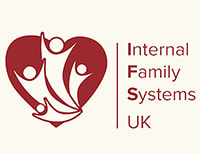What is IFS therapy?

IFS (Internal Family Systems) is a non-pathologising therapy model that offers a map for understanding inner dynamics and easing inner conflict. IFS views psychic multiplicity as the norm: we all have 'parts' that show up as competing voices, thoughts, impulses, physical sensations and desires and can express themselves through inhibiting and/or extreme behaviours. In IFS therapy, we believe that despite their negative impact, all parts have a positive intention for the system and are trying their best to keep pain at bay. Understanding the workings of our inner system can help us access the compassion and clarity necessary to heal past wounds, and have more choice in how we respond (rather than defensively or impulsively react) to the challenges and complexities of our present life.
According to the developer of IFS therapy, Dick Schwartz, every human being is conceived as a system of inner protective parts that manage our interactions with the world and defend against underlying pain (subdivided into Managers and Firefighters) and wounded inner parts (Exiles) led by a core Self.
According to the developer of IFS therapy, Dick Schwartz, every human being is conceived as a system of inner protective parts that manage our interactions with the world and defend against underlying pain (subdivided into Managers and Firefighters) and wounded inner parts (Exiles) led by a core Self.
- Managers: Their role is to prevent wounds and vulnerability being triggered. They often run our lives and are very dutiful, responsible and proactive. They create stability and encourage improvement, while attempting to keep us in control of situations and relationships. When in their extreme roles Managers can be controlling, obsessive, manipulating, hyper-critical, contemptuous, hostile, unemotional, detached, perfectionist, blaming/shaming, highly over-responsible or chronically self-sacrificing. Their motto is 'Never again'.
- Firefighters: While managers are proactive, FFs are reactive. In their most positive role, FFs try to balance manager's energy by promoting rest, fun, excitement and pleasure in someone's lives. However, when emotional pain and wounds are triggered, firefighters respond by numbing, distracting, deflecting or soothing through impulsive behaviours, such as substance abuse, sexual ‘acting out,’ gambling, chaotic spending, disordered eating, self-harming and in extreme cases suicide. In their extreme roles, the firefighters' motto is 'Whatever it takes', as such they are often misunderstood and rejected, both internally and externally.
- Exiles : They don't have a role as such, rather they carry memories unresolved pain and embody our vulnerability, sensitivity, open-hardheartedness and innocence and are often very young. Exiles absorb the energy in the relational field and carry memories of un-integrated, painful events which develop core negative beliefs, feelings and sensations (called burdens in IFS language). They are vulnerable and hold feelings that are uncomfortable to feel -loneliness, abandonment, unloved, worthlessness, shamefulness, rejected, out of control, terror, panic, humiliation, rejection, guilt, victimised; unforgiven or unforgivable. Exiles are not the burdens they carry, and they are core to our full humanity.
- Self : The Self is the natural leader of our systems and occupies the seat of Consciousness. No matter what happened to us, Self is a deep and undamaged resource in all of us and is characterised by the following qualities (the 8Cs): Calm, Connectedness, Courage, Creativity, Compassion, Curiosity, Confidence and Clarity. When Self leads the system, we feel a combination of those qualities, however, if one or more parts take the lead (referred to as blending in IFS), we feel the part's feelings and think its thoughts, in brief, we see the world through the eyes of the part and lack a larger perspective. We also make decisions from that place.
